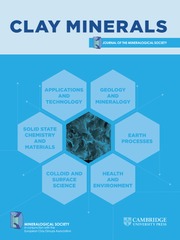Crossref Citations
This article has been cited by the following publications. This list is generated based on data provided by
Crossref.
Jock Churchman, G.
Pasbakhsh, Pooria
and
Hillier, Stephen
2016.
The rise and rise of halloysite.
Clay Minerals,
Vol. 51,
Issue. 3,
p.
303.
Massaro, M.
Colletti, C. G.
Lazzara, G.
Milioto, S.
Noto, R.
and
Riela, S.
2017.
Halloysite nanotubes as support for metal-based catalysts.
Journal of Materials Chemistry A,
Vol. 5,
Issue. 26,
p.
13276.
Mikoda, Bartosz
Gruszecka-Kosowska, Agnieszka
and
Klimek, Agnieszka
2017.
Copper flotation waste from KGHM as potential sorbent for heavy metal removal from aqueous solutions.
Human and Ecological Risk Assessment: An International Journal,
Vol. 23,
Issue. 7,
p.
1610.
Mikoda, Bartosz
Gruszecka-Kosowska, Agnieszka
Klimek, Agnieszka
and
Tomczyk, Anna
2018.
Air pollution control and flue gas desulfurization residues from Polish copper smelting facility as adsorbents of Pb(II) and Cu(II) from aqueous solutions.
Environmental Science and Pollution Research,
Vol. 25,
Issue. 31,
p.
31520.
Lazzara, Giuseppe
Massaro, Marina
and
Riela, Serena
2018.
Phytotoxicity of Nanoparticles.
p.
151.
Anastopoulos, Ioannis
Mittal, Alok
Usman, Muhammad
Mittal, Jyoti
Yu, Guanghui
Núñez-Delgado, Avelino
and
Kornaros, Michael
2018.
A review on halloysite-based adsorbents to remove pollutants in water and wastewater.
Journal of Molecular Liquids,
Vol. 269,
Issue. ,
p.
855.
Maric, Tijana
Mayorga‐Martinez, Carmen C.
Khezri, Bahareh
Nasir, Muhammad Zafir Mohamad
Chia, Xinyi
and
Pumera, Martin
2018.
Nanorobots Constructed from Nanoclay: Using Nature to Create Self‐Propelled Autonomous Nanomachines.
Advanced Functional Materials,
Vol. 28,
Issue. 40,
Aly, Anwar A.
Alashgar, Khalid N. S.
Al-Farraj, Abdullah S.
and
Ibrahim, Hesham M.
2018.
Contaminants and salinity removal of olive mill wastewater using zeolite nanoparticles.
Separation Science and Technology,
Vol. 53,
Issue. 11,
p.
1638.
Matusik, Jakub
Hyla, Jakub
Maziarz, Paulina
Rybka, Karolina
and
Leiviskä, Tiina
2019.
Performance of Halloysite-Mg/Al LDH Materials for Aqueous As(V) and Cr(VI) Removal.
Materials,
Vol. 12,
Issue. 21,
p.
3569.
Maziarz, Paulina
Matusik, Jakub
Leiviskä, Tiina
Strączek, Tomasz
Kapusta, Czesław
Marek Woch, Wiesław
Tokarz, Waldemar
and
Górniak, Katarzyna
2019.
Toward highly effective and easily separable halloysite-containing adsorbents: The effect of iron oxide particles impregnation and new insight into As(V) removal mechanisms.
Separation and Purification Technology,
Vol. 210,
Issue. ,
p.
390.
Bessaha, F.
Mahrez, N.
Marouf-Khelifa, K.
Çoruh, A.
and
Khelifa, A.
2019.
Removal of Congo red by thermally and chemically modified halloysite: equilibrium, FTIR spectroscopy, and mechanism studies.
International Journal of Environmental Science and Technology,
Vol. 16,
Issue. 8,
p.
4253.
Maziarz, Paulina
Matusik, Jakub
and
Radziszewska, Agnieszka
2019.
Halloysite-zero-valent iron nanocomposites for removal of Pb(II)/Cd(II) and As(V)/Cr(VI): Competitive effects, regeneration possibilities and mechanisms.
Journal of Environmental Chemical Engineering,
Vol. 7,
Issue. 6,
p.
103507.
Harrou, Achraf
Gharibi, Elkhadir
Nasri, Hicham
and
El Ouahabi, Meriam
2020.
Thermodynamics and kinetics of the removal of methylene blue from aqueous solution by raw kaolin.
SN Applied Sciences,
Vol. 2,
Issue. 2,
Liu, Yue
Pang, Hongwei
Wang, Xiangxue
Yu, Shujun
Chen, Zhongshan
Zhang, Pan
Chen, Lan
Song, Gang
Saleh Alharbi, Njud
Omar Rabah, Samar
and
Wang, Xiangke
2021.
Zeolitic imidazolate framework-based nanomaterials for the capture of heavy metal ions and radionuclides: A review.
Chemical Engineering Journal,
Vol. 406,
Issue. ,
p.
127139.
Wang, Shenwan
Xiao, Dao
Zheng, Xiaoyan
Zheng, Lili
Yang, Yang
Zhang, Haide
Ai, Binling
and
Sheng, Zhanwu
2021.
Halloysite and coconut shell biochar magnetic composites for the sorption of Pb(II) in wastewater: Synthesis, characterization and mechanism investigation.
Journal of Environmental Chemical Engineering,
Vol. 9,
Issue. 6,
p.
106865.
Mao, Shanshan
and
Gao, Manglai
2021.
Functional organoclays for removal of heavy metal ions from water: A review.
Journal of Molecular Liquids,
Vol. 334,
Issue. ,
p.
116143.
Zhang, Tingting
Wang, Wei
Zhao, Yunliang
Bai, Haoyu
Wen, Tong
Kang, Shichang
Song, Guangsen
Song, Shaoxian
and
Komarneni, Sridhar
2021.
Removal of heavy metals and dyes by clay-based adsorbents: From natural clays to 1D and 2D nano-composites.
Chemical Engineering Journal,
Vol. 420,
Issue. ,
p.
127574.
Yu, Jiexuan
Zhang, Kegang
Duan, Xuelei
Zhao, Changxian
Wei, Xiaoyang
Guo, Qi
and
Yuan, Chun-Gang
2022.
Simultaneous removal of arsenate and arsenite in water using a novel functional halloysite nanotube composite.
Environmental Science and Pollution Research,
Vol. 29,
Issue. 51,
p.
77131.
Li, Ying
Yuan, Xingzhong
Jiang, Longbo
Dai, Huan
Zhao, Yanlan
Guan, Xian
Bai, Jing
and
Wang, Hou
2022.
Manipulation of the halloysite clay nanotube lumen for environmental remediation: a review.
Environmental Science: Nano,
Vol. 9,
Issue. 3,
p.
841.
Álvarez-Álvarez, J.A.
Aguilar-Aguilar, A.
Robledo-Cabrera, A.
Ocampo-Perez, R.
Leyva-Ramos, R.
and
Padilla-Ortega, E.
2023.
Contribution of halloysite as nanotubular clay mineral on mechanism and adsorption rate of Cd(II) onto nanocomposites alginate-halloysite.
Environmental Research,
Vol. 216,
Issue. ,
p.
114772.

